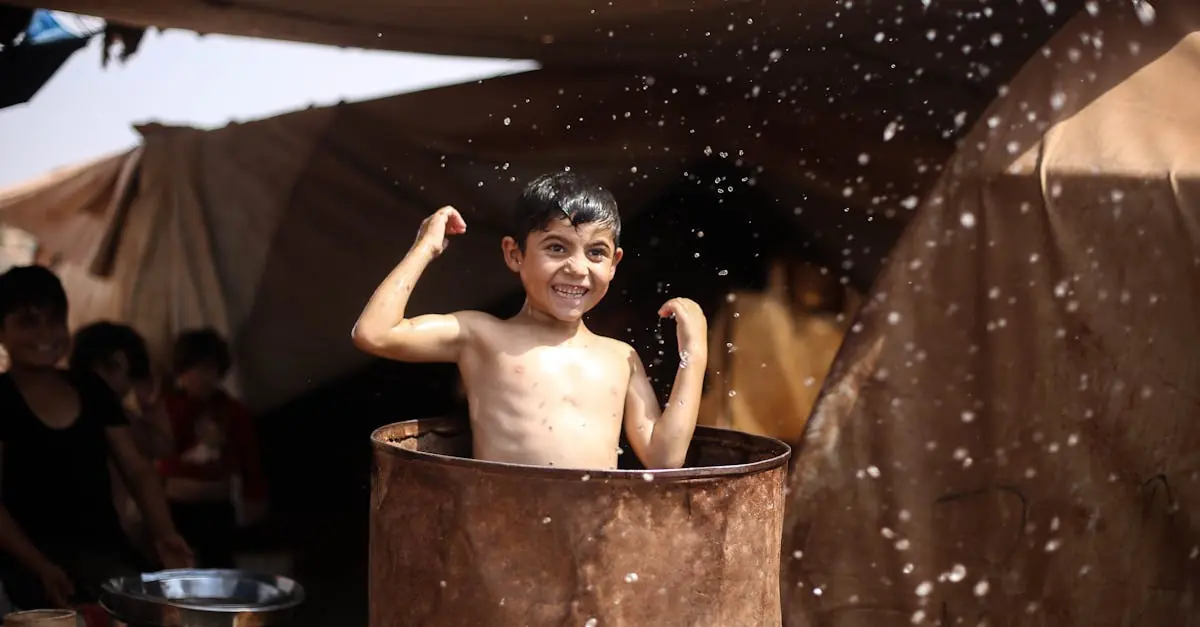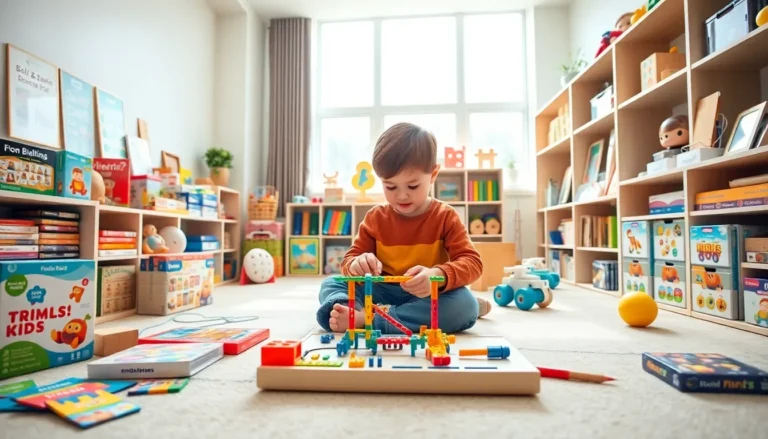Summer camp isn’t just for canoeing and campfires; it’s a magical place where kids can thrive, especially those with autism. Imagine a world where laughter fills the air, friendships bloom, and every child feels included. That’s the beauty of summer camps tailored for kids on the spectrum. They’re not just about fun; they’re about growth, connection, and creating unforgettable memories.
These camps offer specialized programs designed to nurture individual strengths while providing a safe and supportive environment. With activities ranging from arts and crafts to nature exploration, kids can discover their passions and develop social skills without the pressure of everyday life. So why not let your child embark on an adventure that’s as unique as they are? Summer camp could be the ticket to a season filled with joy and self-discovery.
Table of Contents
ToggleOverview of Summer Camps for Kids with Autism
Summer camps tailored for kids with autism focus on creating an inclusive environment. These camps emphasize individual strengths, helping children develop skills while participating in structured activities. Many programs integrate arts, crafts, and nature exploration into their schedules.
Social skills development remains a core objective during these camps. Children interact with peers in supervised settings, allowing them to form friendships and build confidence. Activities are often designed to accommodate various sensory needs, ensuring every child feels comfortable and engaged.
Camps typically feature trained staff experienced in managing autism spectrum disorders. Counselors and assistants provide support as kids navigate new experiences and challenges. Specialized programs often include therapy elements, such as speech and occupational therapy, enhancing personal growth.
Parent involvement plays a vital role in several camp settings. Prior to camp, families may participate in orientations to understand programs better. Open communication between camp staff and parents fosters a collaborative approach, enhancing each child’s experience.
Local and national organizations administer many summer camps designed for kids with autism. Programs vary in duration, from week-long to several weeks, accommodating different family schedules. Financial assistance is often available, ensuring access for families from various socioeconomic backgrounds.
Choosing the right camp can significantly impact a child’s summer experience. Prioritizing the child’s interests and specific needs allows families to select programs that best suit their goals. Positive experiences in camp settings often translate into greater social and emotional well-being for children on the spectrum.
Benefits of Summer Camp for Kids with Autism
Summer camps for kids with autism offer numerous advantages, focusing on individual strengths and social connections.
Social Skills Development
Social skills development occurs through interactions with peers and staff. Children engage in group activities that require teamwork, promoting cooperation and communication. These structured interactions foster friendships, helping kids practice initiating conversations and responding to social cues. Camp settings encourage problem-solving during collaborative games, enhancing their ability to navigate social situations effectively. With trained staff providing guidance, children receive support in understanding emotional responses, creating a more comfortable environment for socialization. Camps often incorporate role-playing scenarios to further refine skills like sharing and empathy, which are essential for building lasting relationships.
Emotional Growth
Emotional growth takes center stage at summer camps designed for kids with autism. These environments allow children to explore their feelings in a supportive atmosphere. Self-regulation techniques and coping strategies become part of the daily routine, empowering kids to manage anxiety or frustration. Opportunities for self-expression arise through creative activities, helping kids articulate their emotions through art or music. Participation in camp events instills a sense of accomplishment, boosting self-esteem. As children face new experiences, they develop resilience and adaptability, important traits for navigating future challenges. The encouragement from peers and staff contributes to a positive self-image, fostering overall emotional well-being.
Types of Summer Camps Available
Summer camps for children with autism cater to various needs and preferences, offering different environments that promote growth and learning.
Therapeutic Camps
Therapeutic camps focus on incorporating therapy into daily activities. These camps often feature speech, occupational, and behavioral therapy sessions integrated with recreational activities. Trained professionals facilitate skill-building in a natural setting. Activities range from art projects to physical games, all designed to improve communication and social skills. Campers interact with peers, fostering relationships and enhancing emotional regulation. Parents see notable progress as children develop coping strategies and self-confidence in a supportive atmosphere.
Traditional Camps with Support
Traditional camps with support provide a familiar camp experience while accommodating children with autism. These camps typically offer general activities, like swimming, hiking, and crafts, with additional support staff trained to address specific needs. Caregivers monitor sensory sensitivities, ensuring environments remain welcoming and non-overwhelming. Structured schedules help kids feel secure, while diverse activities encourage participation and teamwork. Social interactions thrive as children engage with peers, enriching their summer experience through shared adventures. Parents appreciate the balance of traditional fun and essential support for their children.
Activities Offered at Summer Camps
Summer camps tailored for children with autism feature a variety of engaging activities, ensuring each child experiences personal growth while enjoying their summer.
Outdoor Adventures
Outdoor activities play a significant role in summer camp experiences. Hiking trails allow kids to explore nature and develop a connection with the environment. Swimming sessions enable children to enhance their physical coordination and build confidence in the water. Team-based games support social interactions, helping campers cultivate communication skills through collaborative play. Nature scavenger hunts offer opportunities for sensory engagement, encouraging kids to discover and appreciate their surroundings. These experiences not only promote physical health but also foster emotional resilience, essential for overall well-being.
Creative Arts
Creative arts provide an expressive outlet for campers, allowing them to explore their imaginations. Art projects help children communicate feelings visually, fostering emotional expression. Music sessions introduce campers to rhythm and melody, enhancing auditory processing and coordination. Drama activities encourage role-play, enabling kids to practice social scenarios in a supportive environment. Craft workshops promote fine motor skills and offer a sense of accomplishment upon completion. Each artistic endeavor nurtures self-esteem, helping children develop a strong identity while building friendships through shared creativity.
Selecting the Right Camp
Selecting the right camp can significantly enhance a child’s summer experience. Consider specific factors to ensure the camp’s environment meets the child’s unique needs.
Factors to Consider
Program structure plays a key role in determining a suitable camp. Look for a structured daily routine that offers predictability, which benefits children with autism. Staff qualifications are essential; staff trained in autism spectrum disorders provide necessary support. Sensory accommodations also matter, as many camps adapt activities for various sensory sensitivities. Additionally, camper-to-staff ratios affect individual attention; lower ratios often result in better support. Location accessibility ensures families can conveniently drop off and pick up their children. Lastly, program duration can influence experiences; shorter or longer sessions cater to different comfort levels.
Questions to Ask
Ask about the staff’s training and experience regarding autism. Inquire about how they handle behavioral challenges while maintaining a positive environment. Understanding the camp’s safety protocols is crucial; knowing emergency procedures provides peace of mind. Find out more about the daily schedule; knowing when activities occur helps gauge suitability. Explore opportunities for parent involvement; some camps offer orientation sessions to maintain open communication. Investigating available therapeutic options reveals additional support systems. Lastly, review testimonials from other parents; feedback strengthens confidence in the decision-making process.
Summer camps designed for children with autism offer invaluable opportunities for growth and connection. These programs create safe spaces where kids can explore their interests while developing essential social and emotional skills. With trained staff and a focus on inclusivity, campers can engage in activities that promote self-discovery and resilience.
Choosing the right camp is crucial for maximizing these benefits. Families can enhance their child’s summer experience by considering factors like staff qualifications and sensory accommodations. Ultimately, the right summer camp can provide lasting memories and friendships, ensuring a joyful and enriching experience for children on the spectrum.





